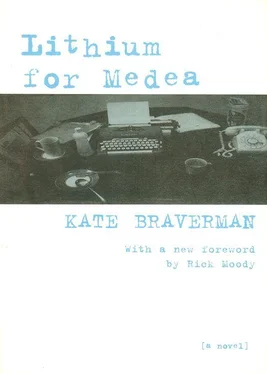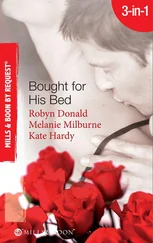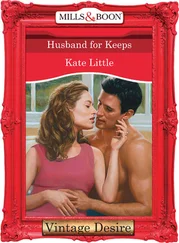“He’s stronger, you’ll see,” Francine said, desperate, betraying her lack of conviction. She was walking in front of me, a bright red straw hat balanced on top of her head. All I had to do was stay on my feet and follow the bouncing red straw ball.
Francine veered into a small cubicle near my father’s room. It was a storage room. Francine opened her red canvas carrying bag and began filling it with bars of soap, thermometers, Band-Aids, plastic drinking cups, washcloths and hospital gowns. She moved quickly. No one noticed.
“Five hundred forty bucks a day,” she observed softly. “They owe me something.”
I followed Francine into my father’s room. He was staring at the far wall. His face was a dark scowl between the white gauze. The feeding tube in his nose was red, a kind of tusk. I tried to think of something to say.
WHATS THIS. My father pointed to the oxygen tank.
“It’s oxygen. It’s temporary. They’ll take it out of here tomorrow.”
My father’s eyes were very black. They looked liquid, a kind of ink. His hand rested on top of his writing pad. I noticed the IV bottle was gone.
“See? They’ve already taken away the IV,” I said.
My father seemed to be dozing. He opened his black eyes. He reached for his writing pad.
WHATS THIS.
“Oxygen. It’s temporary.”
“Read him the paper,” Francine suggested. She produced the morning newspaper from her red canvas bag. She had to tape a program in Burbank. She was pacing nervously. Her suit jacket was unbuttoned, revealing a low-cut white silk blouse. I walked Francine into the corridor.
“What are you staring at?” Francine demanded. “My dress? Listen, kid. It cheers him up, believe me.”
Her high-heeled shoes make a hard click, click, click on the green tiled floor. When Francine rounded the corridor to the elevator, I walked back into my father’s room.
“Do you want to hear the news?”
My father is fanatical about the news. He begins each morning with a thorough study of the newspaper, sports section first, then the front page and editorials. He knows what’s going on in Cuba and Korea and Great Britain. He just doesn’t care. Republicans or Democrats? My father would shrug the way he does at a Monday-night baseball game between the Padres and Braves.
“I’m an impartial observer,” he would say, a cigar in his hand. “I just want to see a good fight.”
Now he was lying motionless. His eyes were closed.
“I’ll read you the sports first,” I said.
I began with the race results. I hoped for large Exactas, two-and three-thousand-dollar payoffs that might excite him. When there were only favorites, first and second choices, I invented long shots for him.
WHATS THIS.
“Oxygen, Daddy. Do you hurt? Do you want another shot?” Francine and I always offered my father a shot.
“Five hundred forty bucks a day,” my mother said once. “He deserves a buzz.”
My father was lying very still. A tear fell from his eye. He batted it down awkwardly with his hand, as if it were a terrible insect perched on his cheek. A killer.
NO WORDS, my father wrote on his pad. Then he turned his bandaged face away from me, toward the green enamel wall.
I drove home quickly, west, rushing for the sea, as if I were being pursued. Trucks surged around me like ancient enraged beasts shaking the air, cutting a path through the day, leaving the morning bruised.
It was early, not yet noon. I did what I was supposed to do. I went out collecting Jason’s rents.
I walked carefully. If I walk on any one stretch of street or beach too often, it becomes bleached and dulled. If I am not careful, the world can become composed of papier-mâché buildings dead under a pale blue painted backdrop of sky.
It is essential that each building, each storefront, café and apartment house, retain distinct qualities, now white stucco, now brick, now wood slats or asphalt slabs. I noted each terracotta pot of red geraniums on porches and balconies. The sun numbs and strips my senses. I forced myself to see differences, the shades of gray in shingles and the print in polished cotton curtains.
It was clear. A breeze had pushed the sullen air from rooftops and sidewalks. I understood that the entire world was precisely the same. It was composed of millions of streets with balconies, liquor stores and fruit stands. The earth was simply a matter of liquid blues, sandy places, brown gullies, the green of valleys, white rock, the indeterminate pales of dry brush and gray asphalt. Angles could be elongated. A horizontal plane could be pushed out, a vertical line stretched. But the basic elements remained the same, fixed, a series of almost infinite geometric patterns altering only in proportion and color.
I was surprised and saddened by this knowledge. I saw that the world was simply variation. One could add more. The blue-white of hillsides under snow, perhaps. But the basic elements differed only in arrangement. The combinations were preordained, defined and limited.
I realized my life was also defined. The boundaries of my world were the canals on one side and the ocean on the other. Jason sat squarely in the center.
I shrugged, a piece of the beach brushing against doors. I collected the rent from Mr. Gordon. He’s eighty-four years old and lives alone in a brick building facing the boardwalk. I watched him, arthritic and deaf as he brewed tea for me on his hot plate. The sun beat itself raw against his streaked gray windows. I watched him pour the tea into porcelain cups and slide them expertly into the centers of matched saucers. He was telling me about summer in New York when he was young and played the mandolin on rooftops in a slow dull wet heat. He was speaking without sorrow, as if it had happened to someone else.
Then he remembered the mandolin. He went into his tiny bedroom. I heard him rummaging. I imagined the mandolin, the wood infinitely fine, almost reddish like a stretched heart. I was afraid of the exquisitely carved and polished wood, the row of tight strings, bunched out and still hopeful. If I touched it something terrible would be imparted to me, through my fingers and into my flesh. I stood up quickly, the room spinning, my forehead stinging hot, and left, forgetting the rent.
I often forget the rents. I found myself standing in one of Jason’s wooden cottages. I stared at a woman with gray hair hidden under a red cotton kerchief. She could have stood pounding clothing clean on rocks in a stream in a Polish village with my grandmother and her mother before the whole world changed.
Her eyes were manic, bright blue, knowledgeable, measuring. I was afraid of her history and what she could teach me. All old women have buried husbands who were scholars, men who taught the children in small back rooms in the east side of some city once.
I watched the old woman write a check with trembling hands swollen from disease and age. I glanced at her captured plants in dirty pots and the shelves of books that I knew would leave a brownish clotted dust across my hands. I was afraid of this residue, the sense of an imprint on my flesh, alive like a leech burrowing in.
I could almost hear the old woman’s thoughts. Who could have foreseen this place, this Venice, California? There was no hint of this in the Florida winters, no omen of this far west coast with the painted and ragged young, stumbling drunk or high on drugs at noon, throwing driftwood at stray dogs and meeting in alleys behind her cottage to conduct business of an illicit, perhaps even demonic nature. There was no sense of this isolation and chaos in all the years of ordered Friday-night suppers, Thanksgivings and graduations and all the good seasons without locusts, fires or plagues.
When the old woman talked, her bony hands fluttered at her sides. She could lift out the years as simply as one takes a lipstick from a purse, reach in and hold up ’31 or ’47 or ’66. I was terrified that she would somehow do this. I didn’t want to see the frail dissolving spines of a life. I didn’t want to see the years crack and splinter in the sunlight, become dust before she could even begin to explain.
Читать дальше












